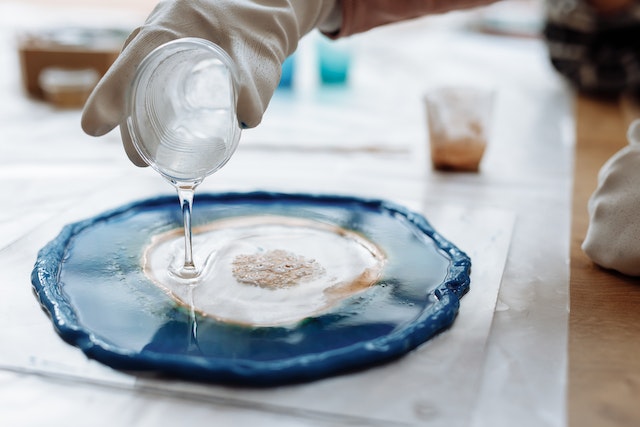Epoxy and Polyurethane floor coatings are very easy to keep clean, resistant to chemical spills, and suitable for various industries and applications. Selecting the ideal floor coating depends on industry needs.
PU floors are more flexible and can flex to accommodate changing temperatures more easily, while epoxy can crack under such circumstances.
Durability
There are various factors that contribute to an epoxy floor’s lifespan, including traffic levels and chemical exposure. Chemical exposure in particular can lead to quick degradation and breakdown, costing more in repairs or replacement costs down the line.
Polyurethanes are an ideal choice for these applications as they have superior chemical resistance. Their chemical-proof coatings protect surfaces against damage caused by abrasion, splashes, drips and droplets of corrosive substances; plus UV rays which have the power to yellow and fade other types of epoxy flooring surfaces.
Polyurethanes differ from epoxy by being softer and more elastic, which makes them more resistant to scratching as their elasticity helps absorb some of the impact. Polyurethane flooring may also be better suited to freezing chambers where extreme temperatures would put strain on other flooring options.
On the downside, PU flooring coating can be more challenging to work with than epoxy due to its short pot life, recoat time, and humidity sensitivity requirements. Therefore, professional assistance may be beneficial in any installations involving PU floor resins; once cured however it offers long term durability with reduced maintenance requirements than an epoxy system.
Aesthetics
These systems not only boast long-term durability, but are also beautiful. Coatings come in an assortment of colors to fit in with your company’s aesthetic while the systems come complete with primer coat, urethane coat and topcoat applications to achieve the look you’re going for – polyurethane provides an attractive finish while resisting chemicals better and being less vulnerable to scratching from machinery traffic or people walking across it.
PU flooring’s elastic properties also makes it more resistant to impact damage than epoxy flooring, making it the better choice in environments that see heavy foot and vehicle traffic. Furthermore, this elasticity makes PU an excellent option for industrial food processing companies using lactic acids which may cause corrosion or yellowing of epoxy systems.
PU floors are easier to work with than epoxy; their pot life, recoat time, and curing window are significantly shorter, enabling contractors to complete multicoat projects more quickly. Furthermore, UV stable (aliphatic PU) formulations protect floors from color fade and yellowing over time – an attractive selling point for customers seeking both an hardwearing yet beautiful solution for their floor covering.
Thermal Shock Resistance
Polyurethane floor coating is an incredibly resilient floor treatment, boasting superior shock resistance over epoxy. This makes it the ideal choice for heavy equipment environments where there will be frequent impact to the floor surface, while providing greater flexibility that enables flex rather than crack and break, which explains why many companies choose Polyurethane over Epoxy for environments subject to temperature extremes.
Another key advantage of Polyurethane floors is how easy they are to keep clean compared to epoxy floors, particularly in high traffic areas where cleaning up debris that gets tracked in is of critical importance. Furthermore, Polyurethane’s moisture and humidity resistance means it won’t corrode or warp under these influences either.
Epoxy flooring may not be as resilient against abrasion, impact or thermal shock as Polyurethane; this can result in early damage that will cost more in maintenance costs over its lifespan and be more difficult to repair than Polyurethane alternatives. This is especially important for floors that are regularly trowel-applied, since hand troweled epoxy may become chalky and brittle over time. Urethane provides a smooth texture that remains intact over its lifespan. As such, they have become the preferred choice in warehouse floors, loading docks and machine shops as well as back-of-house areas and high traffic zones in assisted living facilities, nursing homes, hospitals, hotels/casinos/casinos as well as schools/universities.
Humidity Resistance
Polyurethane provides superior humidity resistance over epoxy. With excellent water- and moisture resistance, Polyurethane makes an excellent choice for areas subject to frequent liquid spills or high levels of humidity, and its resistance against mold growth makes it suitable for pharmaceutical or food processing companies, customer handling areas such as airport lobbies or industrial warehouses that handle chemical solutions.
Coatings One 85% is less prone to scratching than epoxy, providing greater durability in areas with heavy foot traffic. Furthermore, its elastic properties make it better equipped to absorb shock caused by forklift or vehicle traffic and make it an excellent floor coating option for multi-deck car parks and large spaces that experience significant amounts of machine traffic. Furthermore, this solvent-based urethane provides high abrasion and oil-resistance.
Polyurethane flooring systems are unaffected by UV light, unlike epoxy which fades or yellows over time. It is therefore an important consideration when looking at your environment and the amount of sunlight it receives, yet this can easily be solved by adding a UV-resistant top coat to either fully color flake or clear Polyurethane floor coating systems. Adding such top coats may prevent yellowing – the most efficient approach would be coating with full color chip UV stable system followed by several coats of clear polyurethane coating system will prevent fading or yellowing over time!
When it comes to enhancing the durability, aesthetics, and functionality of your floors, epoxy and polyurethane floor coatings stand as two popular contenders. However, making the right choice between these coatings requires a clear understanding of their characteristics and benefits. Let’s delve into a comparative guide that will help you navigate the decision-making process and choose the ideal solution for your flooring needs.
Epoxy Floor Coatings: Strength and Resilience
Epoxy floor coatings are renowned for their exceptional durability and strength. These coatings bond tightly to the underlying concrete, forming a robust surface that can withstand heavy traffic, impact, and chemicals. Epoxy coatings are a preferred choice for industrial settings, warehouses, garages, and commercial spaces that experience high wear and tear. They are available in a variety of colors and finishes, allowing for creative design options.
Polyurethane Floor Coatings: Flexibility and Protection
Polyurethane floor coatings offer a unique blend of flexibility and protection. These coatings are more elastic compared to epoxy, making them ideal for environments where the floor may be subjected to movement or vibrations. Polyurethane coatings also excel in providing resistance against UV rays, making them suitable for outdoor applications. They offer enhanced chemical resistance and are easy to clean, making them a popular choice for food processing facilities, healthcare settings, and laboratories.
Factors to Consider:
Usage and Traffic: Consider the level of foot traffic, vehicle movement, and potential impact the floor will endure. Epoxy coatings are excellent for heavy-duty environments, while polyurethane coatings offer flexibility and are suitable for spaces with varying levels of activity.
Aesthetics: Both epoxy and polyurethane coatings offer a range of finishes and colors. Consider the visual impact you want to achieve for your space.
Chemical Resistance: Evaluate the type of chemicals and substances the floor will be exposed to. Epoxy coatings provide strong chemical resistance, while polyurethane coatings offer protection against a broader range of chemicals.
UV Exposure: For outdoor or areas with direct sunlight exposure, polyurethane coatings are better equipped to withstand UV rays.



